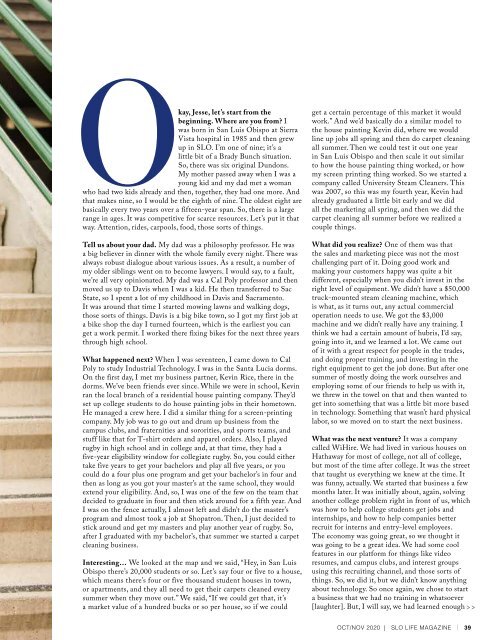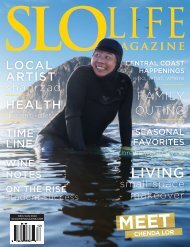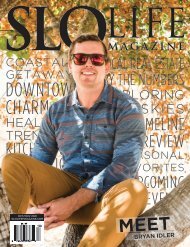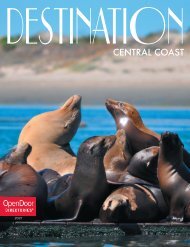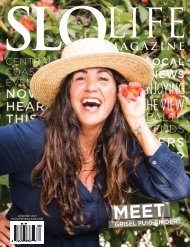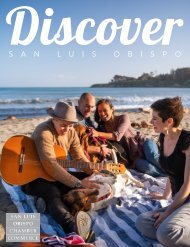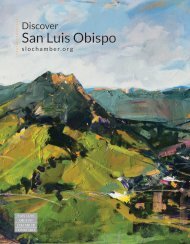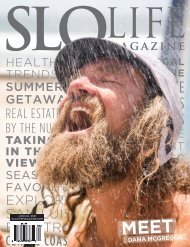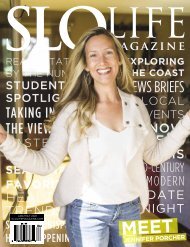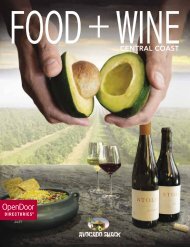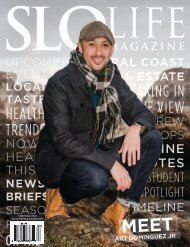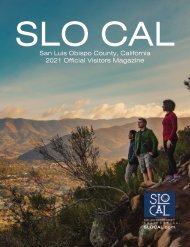SLO LIFE Oct/Nov 2020
Create successful ePaper yourself
Turn your PDF publications into a flip-book with our unique Google optimized e-Paper software.
kay, Jesse, let’s start from the<br />
beginning. Where are you from? I<br />
was born in San Luis Obispo at Sierra<br />
Vista hospital in 1985 and then grew<br />
up in <strong>SLO</strong>. I’m one of nine; it’s a<br />
little bit of a Brady Bunch situation.<br />
So, there was six original Dundons.<br />
My mother passed away when I was a<br />
young kid and my dad met a woman Owho had two kids already and then, together, they had one more. And<br />
that makes nine, so I would be the eighth of nine. The oldest eight are<br />
basically every two years over a fifteen-year span. So, there is a large<br />
range in ages. It was competitive for scarce resources. Let’s put it that<br />
way. Attention, rides, carpools, food, those sorts of things.<br />
Tell us about your dad. My dad was a philosophy professor. He was<br />
a big believer in dinner with the whole family every night. There was<br />
always robust dialogue about various issues. As a result, a number of<br />
my older siblings went on to become lawyers. I would say, to a fault,<br />
we’re all very opinionated. My dad was a Cal Poly professor and then<br />
moved us up to Davis when I was a kid. He then transferred to Sac<br />
State, so I spent a lot of my childhood in Davis and Sacramento.<br />
It was around that time I started mowing lawns and walking dogs,<br />
those sorts of things. Davis is a big bike town, so I got my first job at<br />
a bike shop the day I turned fourteen, which is the earliest you can<br />
get a work permit. I worked there fixing bikes for the next three years<br />
through high school.<br />
What happened next? When I was seventeen, I came down to Cal<br />
Poly to study Industrial Technology. I was in the Santa Lucia dorms.<br />
On the first day, I met my business partner, Kevin Rice, there in the<br />
dorms. We’ve been friends ever since. While we were in school, Kevin<br />
ran the local branch of a residential house painting company. They’d<br />
set up college students to do house painting jobs in their hometown.<br />
He managed a crew here. I did a similar thing for a screen-printing<br />
company. My job was to go out and drum up business from the<br />
campus clubs, and fraternities and sororities, and sports teams, and<br />
stuff like that for T-shirt orders and apparel orders. Also, I played<br />
rugby in high school and in college and, at that time, they had a<br />
five-year eligibility window for collegiate rugby. So, you could either<br />
take five years to get your bachelors and play all five years, or you<br />
could do a four plus one program and get your bachelor’s in four and<br />
then as long as you got your master’s at the same school, they would<br />
extend your eligibility. And, so, I was one of the few on the team that<br />
decided to graduate in four and then stick around for a fifth year. And<br />
I was on the fence actually, I almost left and didn’t do the master’s<br />
program and almost took a job at Shopatron. Then, I just decided to<br />
stick around and get my masters and play another year of rugby. So,<br />
after I graduated with my bachelor’s, that summer we started a carpet<br />
cleaning business.<br />
Interesting… We looked at the map and we said, “Hey, in San Luis<br />
Obispo there’s 20,000 students or so. Let’s say four or five to a house,<br />
which means there’s four or five thousand student houses in town,<br />
or apartments, and they all need to get their carpets cleaned every<br />
summer when they move out.” We said, “If we could get that, it’s<br />
a market value of a hundred bucks or so per house, so if we could<br />
get a certain percentage of this market it would<br />
work.” And we’d basically do a similar model to<br />
the house painting Kevin did, where we would<br />
line up jobs all spring and then do carpet cleaning<br />
all summer. Then we could test it out one year<br />
in San Luis Obispo and then scale it out similar<br />
to how the house painting thing worked, or how<br />
my screen printing thing worked. So we started a<br />
company called University Steam Cleaners. This<br />
was 2007, so this was my fourth year, Kevin had<br />
already graduated a little bit early and we did<br />
all the marketing all spring, and then we did the<br />
carpet cleaning all summer before we realized a<br />
couple things.<br />
What did you realize? One of them was that<br />
the sales and marketing piece was not the most<br />
challenging part of it. Doing good work and<br />
making your customers happy was quite a bit<br />
different, especially when you didn’t invest in the<br />
right level of equipment. We didn’t have a $50,000<br />
truck-mounted steam cleaning machine, which<br />
is what, as it turns out, any actual commercial<br />
operation needs to use. We got the $3,000<br />
machine and we didn’t really have any training. I<br />
think we had a certain amount of hubris, I’d say,<br />
going into it, and we learned a lot. We came out<br />
of it with a great respect for people in the trades,<br />
and doing proper training, and investing in the<br />
right equipment to get the job done. But after one<br />
summer of mostly doing the work ourselves and<br />
employing some of our friends to help us with it,<br />
we threw in the towel on that and then wanted to<br />
get into something that was a little bit more based<br />
in technology. Something that wasn’t hard physical<br />
labor, so we moved on to start the next business.<br />
What was the next venture? It was a company<br />
called WiHire. We had lived in various houses on<br />
Hathaway for most of college, not all of college,<br />
but most of the time after college. It was the street<br />
that taught us everything we knew at the time. It<br />
was funny, actually. We started that business a few<br />
months later. It was initially about, again, solving<br />
another college problem right in front of us, which<br />
was how to help college students get jobs and<br />
internships, and how to help companies better<br />
recruit for interns and entry-level employees.<br />
The economy was going great, so we thought it<br />
was going to be a great idea. We had some cool<br />
features in our platform for things like video<br />
resumes, and campus clubs, and interest groups<br />
using this recruiting channel, and those sorts of<br />
things. So, we did it, but we didn’t know anything<br />
about technology. So once again, we chose to start<br />
a business that we had no training in whatsoever<br />
[laughter]. But, I will say, we had learned enough >><br />
OCT/NOV <strong>2020</strong> | <strong>SLO</strong> <strong>LIFE</strong> MAGAZINE | 39


